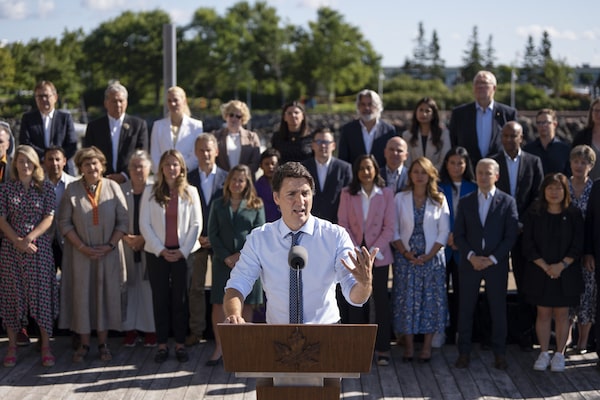
Prime Minister Justin Trudeau speaks to reporters as cabinet members look on during the Liberal cabinet retreat in Charlottetown on Aug. 23.Darren Calabrese/The Canadian Press
If you enjoy howlingly awkward human theatre – and who among us is above such delights? – watching a late-stage government try to gnaw its way out of the bear trap of its own incumbency is spectacular entertainment.
This was on glorious display this week in Charlottetown, where the newly shuffled federal cabinet gathered for a retreat before the House of Commons resumes in mid-September.
That cabinet shuffle had been telegraphed as a big “reset” – but only because the government wanted its best communicators out front, you see, to explain what a bang-up job it was already doing. This is the political spin equivalent of being asked in a job interview what is your worst quality and confessing, with a wince, that you’re a perfectionist who just cares too much.
As even a glancing acknowledgment that things are not going well for a long-in-the-tooth government trailing the Conservatives in polls consistently for the last several months, it wasn’t much of a mea culpa, but points for artistic impression.
So Prime Minister Justin Trudeau and his cabinet found themselves in the absurd position of having to simultaneously insist that everything is great – because they’ve been in charge of all the things for the last eight years – while somehow also responding to the cost-of-living rage-anxiety that Conservative Leader Pierre Poilievre is bottling up like rocket fuel.
There’s a distinct look to this routine when senior government members trot themselves out in front of the cameras and microphones. A shellacked grin that doesn’t reach the eyes, a chipper tone of voice that gives way to broken glass if you push too hard.
It’s all part of the creeping brittleness of this government as it ages. Mr. Trudeau and certain of his ministers seem increasingly peevish that everyone keeps hassling them about what they do instead of properly understanding who they are. That is what gets you the maddening proclivity of this government to offer a purring lecture on its values in response to a practical question about this or that straight fact.
On Tuesday, for instance, a reporter asked Finance Minister Chrystia Freeland what $15-billion in budgetary trims will accomplish, given that it represents less than 0.1 per cent of government spending over five years – or what the Business Council of Canada dismissed as a “rounding error.”
“We are Liberals,” Ms. Freeland responded. “We believe government has an important role to play in supporting Canadians, in building a social-welfare net that supports Canadians and in putting in place programs that help our economy to grow.”
Similarly, reporters asked Mr. Trudeau several different ways what exactly his government was going to do about the housing affordability crisis it had made the headline attraction of its island sojourn, given that it had no concrete announcements to make.
“We recognize – and Canadians know – that there’s not one silver bullet that’s going to solve the housing challenges,” he said. “But they do know that a government that takes it seriously, that works collaboratively and ambitiously with partners across the country, that understands what Canadians are going through and focuses on real solutions, not just slogans and buzzwords, that’s what’s going to solve this challenge.”
Absolutely. So, uh, when do the real solutions follow those slogans and buzzwords you just offered?
This tendency of theirs is like yelling at a bystander that you’ve fallen into the lake and can’t swim, so they need to hold out that branch for you. And then they respond, hand over heart with a dreamy look in their eyes, about how strongly they believe in keeping you safe and dry. That’s nice to know, but for the love of God, what about the branch?
This incumbency trap is also where you get the flagrant abuse of the words “continue” or “always” as a deke. The government will continue to work hard for the middle class and those working hard to join it; it will always welcome new Canadians and make sure they have affordable places to live; it will continue to focus on opportunities for young people, and so on.
At a certain point, this is a ruthless, zero-sum game in both rhetorical terms and three-dimensional reality: Something has either been true all along or it’s new, but it cannot be both.
Either your government will “continue” to do incredible work on the crisis at hand because it has been both properly seized by and resoundingly effective on that file all along, or you have recently found religion on this and now the effective policy-building will begin. One of those realities makes you look incompetent, the other oblivious, and those aren’t fun choices, but that’s the deal when you’re in the big chair.
Mr. Trudeau is right about one thing: There is no silver bullet to solve housing. It’s an immensely complicated issue of the sort that allows each level of government or stakeholder to point at another in blame, and there is a long history of conflicting motivations and choices that got us to this crisis point.
There is one other way out of this bear trap, of course, but it’s a radical move. The government could just explain itself, talk to its audience like adults with brains in their heads, treat practical questions as reasonable propositions deserving of answers rather than vulgarities in need of a good scolding.
The authors of a new report proposing a national housing accord were at the cabinet retreat to offer a housing-reform bootcamp. They said they deliberately focused on doable solutions for a world of finite resources and urgent timelines, not ideas that can only live in a universe made of money and good intentions.
So pick three measures from that report, or some other smart source, that can be enacted now or very soon. Explain in real words with actual meaning why you believe those options to be better than the ones you didn’t pick, and what’s within your control or beyond it. Tell us when they’ll start, how you’ll judge their effectiveness and how you’ll tweak things if they’re not working.
Then walk out the medium- and long-term. What’s next? What are the trade-offs? Don’t pretend there won’t be any, because thinking adults know that everything has a trade-off, and insisting there won’t be any is just aspirational dishonesty.
But let’s be real. At this point, any one of those people doing any of that is less likely than them chewing a limb clean off and standing there in front of the cameras with a rictus grin, pretending it doesn’t hurt.
 Shannon Proudfoot
Shannon Proudfoot